The Defend the Social Safety Net Forum, Tuesday night, October 25th, was a call to action. While speakers provided economic, political and historical context to deepen understanding of the issues, the emphasis of the evening was on action.
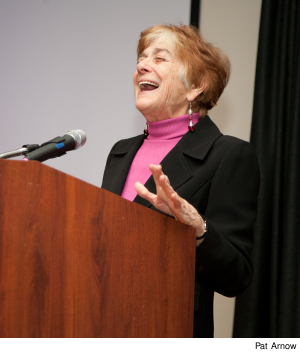 |
The tone was set when an audience of more than two hundred entered the hall. Each person was given a yellow card asking them to check off what they were willing to do, with options ranging from signing petitions to lobbying to educating to demonstrating. The audience handed in the completed cards at the end of the forum.
The audience also received a copy of the new booklet prepared by the PSC’s Social Safety Net Working Group, Defending the Social Safety Net: A Call to Action. Like the forum itself, the booklet is rich in analysis and context, but concludes with a call to action:
This social safety net is ours. We worked for it, we contributed to it, we negotiated for it. We will not let the very few, the very rich, the very powerful (and those whom they have fooled) destroy it.
The forum took place against an ominous backdrop. The so-called “Congressional Super Committee” is currently deliberating, with a mandate to produce trillions of dollars in savings over the next decade in order to reduce the federal budget deficit. Safety net programs are clearly in the crosshairs of the committee as it readies a report to Congress due for release on November 23rd.
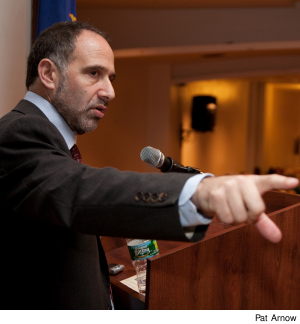 |
Both speakers and audience keyed on how to protect and extend Social Security, Medicare, Medicaid, employee health benefits, public-sector pensions, unemployment benefits and other safety net programs. The defense of the social safety net has particular resonance for adjuncts, given the PSC’s campaign to save and enhance adjunct healthcare insurance.
The keynote speaker, Dean Baker, co-director of the Center for Economic and Policy Research (CEPR), gave a national and global economic context for these attacks on the safety net. Making excellent use of visual materials, Baker punctuated his presentation with telling graphs. One in particular, elicited a lot of response from the audience. It dramatized just how much of the current federal deficit is driven by out-of-control healthcare costs. The United States, by far, has the highest healthcare costs in the world. Baker’s graph showed that if we had costs comparable to either Canada or the United Kingdom, we would ultimately be running a budget surplus. [To see what projected U.S. budget deficits would be if we had the same per person health care costs as any of the countries from a list of nations that enjoy longer life expectancies than the U.S., go to the CEPR Health Care Budget Deficit Calculator. In every case, the U.S. would eventually run a budget surplus.]
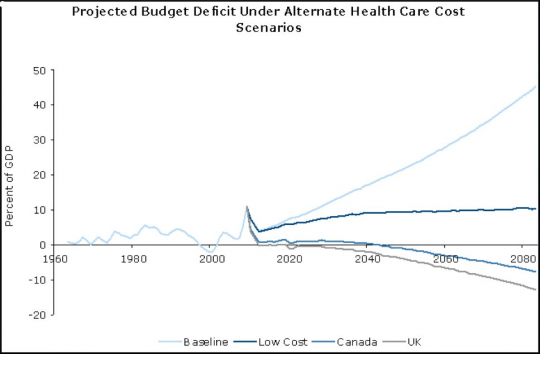
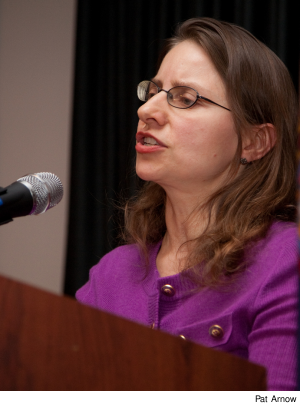 |
Baker made clear that a key to defending Social Security and other safety net programs was economic growth. Rather than deficit reduction, the federal government needed to stimulate the economy with jobs programs, aid to state and local governments and infrastructure projects.
NYU’s Kim Phillips-Fein provided historical context, presenting an overview of organized conservative attacks on the safety net from the thirties to the present. Much of her talk was based on her book, Invisible Hands: The Making of the Conservative Movement from the New Deal to Reagan. She also made some interesting connections with the Occupy Wall Street movement based on research for a new book on the New York City fiscal crisis in the seventies. Pushback by two occupations in the seventies saved two institutions and provides a useful model for resistance in the current fiscal crisis. — one occupation was at Williamsburg firehouse that the city threatened to close and the other at Hostos Community College, scheduled to be shut down by CUNY.
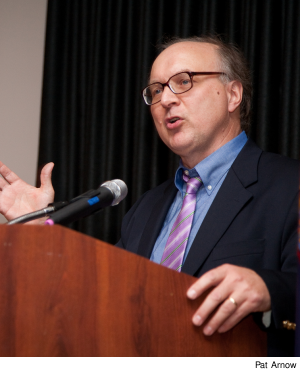 |
James Parrott, from the Fiscal Policy Institute, linked Dean Baker’s big picture analysis to New York State and City. Much of his focus was on Governor Andrew Cuomo, who has made political and economic decisions that privilege the few and punish the many. Cuomo has steadfastly supported the sunsetting of the tax surcharge on the income of New York state’s top 3% tax payers on December 31st – a move that would deprive the state of up to $5 billion dollars and provide a continuing rationale for Cuomo’s austerity policies, attacks on public sector unions and cutbacks to education, Medicaid and other social and safety net programs.
Francis Fox Piven, Distinguished Professor of Sociology and Political Science at the CUNY Graduate Center. led the forum in a discussion of what is to be done. In particular, she emphasized linking the defense of the social safety net to the poorest and most vulnerable among us. Piven engaged the audience in a dialog about the shape and focus of actions in defense of the social safety net.
Speakers from the audience made a wide range of suggestions: electoral work; coalition building with Occupy Wall Street, organized labor, community and advocacy groups; campaigns to withdraw deposits from major banks and to push for increasing taxes on the very rich, major corporations and the financial sector.
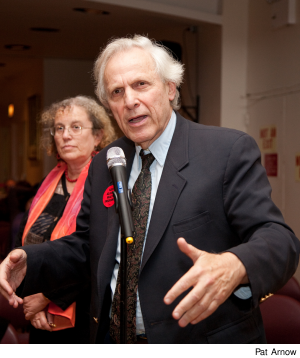 |
The audience was given two quick things that it could do electronically. One, in anticipation of the Super committee report, was to send an “Act Now” letter (on the PSC website) to their representatives and congress, telling them, hands off the social safety net! The second (click here), was to contact their U.S. Senators, calling on them to support Social Security by co-sponsoring the “Keeping Our Social Security Promise Act.” The act calls for lifting the present $106,800 payroll tax cap, thereby extending Social Security at its present level of benefits for another 75 years.
At the conclusion of the event, the Social Safety Net Working Team collected the yellow cards. It will collate the information on the cards and integrate those who signed them into the PSC’s campaign, in coalition with other organizations, to defend the social safety net.

